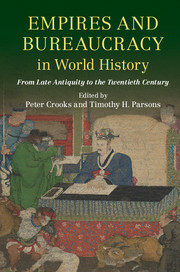Book contents
- Frontmatter
- Contents
- List of Figures
- List of Maps
- List of Tables
- List of Contributors
- Preface
- List of Abbreviations
- Part I Introduction
- Part II Empires and Bureaucracy in World-Historical Perspective
- Part III From Late Antiquity to the Middle Ages
- 6 ‘The Late Roman Empire Was before All Things a Bureaucratic State.’
- 7 Bureaucracies, Elites and Clans: The Case of Byzantium, c.600–1100
- 8 Charlemagne and Carolingian Military Administration
- 9 Bureaucracy, the English State and the Crisis of the Angevin Empire, 1199–1205
- 10 The Parchment Imperialists: Texts, Scribes and the Medieval Western Empire, c.1250–c.1440
- 11 Before Humpty Dumpty: The First English Empire and the Brittleness of Bureaucracy, 1259–1453
- Part IV From the Age of European Expansion to the End of Empires
- Part V Afterword
- Index
6 - ‘The Late Roman Empire Was before All Things a Bureaucratic State.’
from Part III - From Late Antiquity to the Middle Ages
Published online by Cambridge University Press: 05 August 2016
- Frontmatter
- Contents
- List of Figures
- List of Maps
- List of Tables
- List of Contributors
- Preface
- List of Abbreviations
- Part I Introduction
- Part II Empires and Bureaucracy in World-Historical Perspective
- Part III From Late Antiquity to the Middle Ages
- 6 ‘The Late Roman Empire Was before All Things a Bureaucratic State.’
- 7 Bureaucracies, Elites and Clans: The Case of Byzantium, c.600–1100
- 8 Charlemagne and Carolingian Military Administration
- 9 Bureaucracy, the English State and the Crisis of the Angevin Empire, 1199–1205
- 10 The Parchment Imperialists: Texts, Scribes and the Medieval Western Empire, c.1250–c.1440
- 11 Before Humpty Dumpty: The First English Empire and the Brittleness of Bureaucracy, 1259–1453
- Part IV From the Age of European Expansion to the End of Empires
- Part V Afterword
- Index
Summary
My title quotes the opening sentence of the chapter on ‘The civil service’ in A. H. M. Jones's magisterial survey of the social, economic and administrative history of the late Roman empire published in 1964 – a work that still defines the field even after half a century. One might quibble about the emphasis in ‘before all things’, but it is difficult to deny that the late empire demonstrated many aspects of a developed bureaucracy as defined by Max Weber – for example, full-time salaried officials organized into hierarchies of authority, both centrally and regionally, with particular spheres of responsibility and effective communications to ensure cohesion. Members of the administration might not always be exactly aligned with the policies of their imperial masters, as can be seen in the ruse used by Emperor Anastasius (r. 491–518) to abolish the chrysargyron tax, or in the opposition of the praetorian prefect, John the Cappadocian, to Justinian's attack on Vandal Africa in 533. This capacity to resist emperors, however, also meant that administrative structures could survive through regime change, as in the transition from Roman to Ostrogothic Italy in the late fifth century, or the political chaos of the early years of Zeno's reign (late 470s) or the usurpation of Phocas (r. 602–10). The late empire was a territorial state whose frontiers were, in the main, fixed, though this did not prevent the Romans from attempting to exercise authority outside their formal territory, in line with their centuries-old approach to giving orders. Jones's perceptions of the late empire were undoubtedly influenced by the nature of imperial control and organization in the earlier stages of the Roman empire. He, after all, embarked on his study of late Rome after producing authoritative volumes on The Greek city and The cities of the eastern Roman empire, as well as working on the construction of the Roman empire under the first two holders of the title of princeps, Augustus (d. 14 CE) and Tiberius (d. 37 CE).
The early Roman empire has been characterized as ‘undergoverned’ by comparison, for example, with the Chinese empire. This assessment appears in the chapter entitled ‘Government without bureaucracy’ in the authoritative introduction to the empire's economy and society by Garnsey and Saller.
- Type
- Chapter
- Information
- Empires and Bureaucracy in World HistoryFrom Late Antiquity to the Twentieth Century, pp. 129 - 146Publisher: Cambridge University PressPrint publication year: 2016

